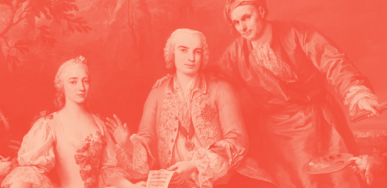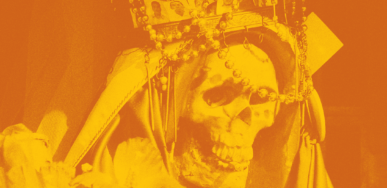
[00:00:04] Kurtis Schaeffer I'm Kurtis Schaeffer.
[00:00:05] Martien Halvorson-Taylor And I'm Martien Halvorson-Taylor, and this is Sacred & Profane.
[00:00:16] Kurtis Schaeffer Last week, we spoke with our colleague Bonnie Gordon about castrati—castrated male singers whose powerful, but high voices came to dominate music written for the Catholic Church. Castrati became a source of tension between a largely Catholic Mediterranean and the rising Protestant North. That fault line that Bonnie Gordon talked about with us, a Europe divided, intersects with our story today.
[00:00:41] Martien Halvorson-Taylor This week, we're again diving into our archives to bring you field notes—great documentary work by UVA students that compliments our own reporting. Evan Sandsmark has been living and studying in Austria on and off for several years now. Months before countries across Europe began going on lockdown to fight COVID-19, Evan brought us this report about how the EU may be more fragile than it appears, and how ethnicity and religion are two of its more enduring fault lines.
[00:01:18] Martien Halvorson-Taylor Above all, Evan says, this is a story about the fragility of the European order. What exactly is happening in Europe? And how is it affecting the lived experience of Europeans residing outside of their home countries?
[00:01:35] Kurtis Schaeffer We'll let Evan take it from here. And afterwards, we'll check in with Evan, who's still in Austria, about how COVID-19 is affecting the EU today.
[00:01:50] Evan Sandsmark The European Union, one of the great triumphs of the postwar liberal order, is in trouble. Its legitimacy is being called into question and its bedrock principles, like the freedom of movement between EU member states, are being tested. Just a few years ago, it would have been strange to claim that migration within the EU is at risk, but with the rise of far-right populist parties across Europe in the wake of Brexit, the continued existence of a strong and unified European Union with open internal borders has never been more in doubt.
[00:02:25] Zisis Vathrakis I’m Zisis Vathrakis, age 24, I came from Greece, and...that’s all.
[00:02:30] Luis Ayuso I'm Luis Ayuso. I’m 37. I come from Spain.
[00:02:36] Evan Sandsmark Both Zisis and Luis moved to Innsbruck, Austria in 2012. Although it was less than a decade ago, it was a very different time in the life of the EU.
[00:02:47] Evan Sandsmark To escape the noise of the city, we met a few miles outside of Innsbruck in a small village tucked into the mountains. The three of us originally met in a German class when we were all new to Austria.
[00:03:04] Evan Sandsmark I'd only come to study German for a year, but they had moved to resettle.
[00:03:09] Evan Sandsmark I came here to study. The reason that motivated me to study abroad and not in Greece was that Greece was in a very deep economical crisis. It still is, but it’s getting better, thank God. But Greece was in such a bad place economically that you had no future there and no chances to study. I can totally understand what Zippy says.
[00:03:39] Evan Sandsmark Zisis generally goes by Zippy, by the way. That's what Luis calls him, and that's how I'll refer to him from now on.
[00:03:44] Evan Sandsmark It is worth mentioning here that before anyone had even heard of Brexit, there was the prospect of Grexit, with a G. In 2015, Greece nearly crashed out of the EU because of a government debt crisis. Had Greece defaulted, leaving behind 400 billion dollars in debt, then the European banks that lent money to Greece could have collapsed. Other countries that were on the verge of bankruptcy might follow.
[00:04:13] Evan Sandsmark This includes Spain, where Luis is from.
[00:04:15] Luis Ayuso Maybe Spain was a little bit lucky, luckier than Greece. But the situation was bad. It was…little chances to develop a successful career, to have a professional life you are happy with. You are forced, or you were forced, to get employment in conditions my parents would not have approved in their time. There was not much room for self-improvement, or to feel proud of what you do, or of personal growth.
[00:04:54] Luis Ayuso It was economically bad. It was also bad for the soul. It was very depressing.
[00:05:03] Evan Sandsmark This is the classic immigrant's tale, and as Europeans, the process of moving to Austria was simple.They didn't need a visa, nor did they have to apply for a work permit. Luis and Zippy are fully entitled to live in Austria, as they are in any other EU member state. But in recent years, things have become more complicated.
[00:05:22] Zisis Vathrakis If I'm allowed to express myself this way, shit is going down and it's going down fast.
[00:05:30] Zisis Vathrakis Europe is very unstable at this moment.
[00:05:32] Evan Sandsmark In light of that, in light of what you see as conditions sort of deteriorating in Austria, do you feel more vulnerable on your status being a resident of Austria but not a citizen of Austria?
[00:05:50] Zisis Vathrakis I wouldn't say that I feel more vulnerable because I'm not a patriot. I would follow the same logic I followed with Greece. When things will get bad, I’ll just fly to a better place. It has its pluses to be from a third-world European country.
[00:06:10] Evan Sandsmark He means this last line about being from a third-world European country as a joke, but one with an edge, given Greece's status in the EU. It's viewed as less developed and more politically unstable compared to countries like Germany or Austria.
[00:06:23] Evan Sandsmark Zippy is less worried about an uncertain future. It has always been uncertain in Greece, and he thinks he can adapt. He'll just move if things turn bad here in Austria. But this freedom to relocate, this unrestricted ability to pursue employment opportunities wherever they arise, is exactly what seems less certain today than ever before. I asked Luis how he feels about the current situation. He's less sanguine than Zippy, and the conversation turns to his concerns for the next several minutes.
[00:06:52] Luis Ayuso I am worried about the situation in Europe right now. And I said if I find trouble on trusting other nations and trust in my co-citizens in this European Union project, I will say it's like a collective depression. Our lives are our unconceivable without the European Union as they are today. I don't need to have a visa or a work permit and I am free to move whenever I want and I will continue being in the same currency. And that alone is just wonderful. I think we don’t value the European Union.
[00:07:45] Evan Sandsmark The various populists and nationalist movements that doubt the purpose and legitimacy of the European Union clearly do not value it. However, it is unclear if these movements are themselves responsible for instability in Europe.
[00:08:00] Luis Ayuso It will not be fair to blame populist movements as the one cause or one single threat of the European Union. Because those populist movements are just a symptom of some sickness or some situation happening somewhere else.
[00:08:23] Evan Sandsmark Of course, sicknesses are hard to diagnose, but when we talk about our own health, we often stress the importance of taking care of our bodies - eating right, exercising - so we're less vulnerable to disease. And the body politic of the EU seems to be suffering from a disease. A great number of people take the institutions that have enabled international cooperation for granted. In some ways, this is a testament to how smoothly the EU has functioned in the decades since World War Two. Populist movements often take advantage of that kind of complacency. It's easy to attack institutions when you don't think they will actually crumble, or when you don't even consider what their absence would mean.
[00:09:05] Zisis Vathrakis I find it funny that we all say this is a terrible time for Europe, but not so long ago we were killing each other and we have been killing each other for centuries. So with all the differences right now, we are in the longest-lasting peace in the history of Europe.
[00:09:26] Evan Sandsmark Do you think that that peace is at all threatened? Because I think even just like five years ago, if you would have said that it's conceivable that a major country like the UK is going to try to leave the European Union and thereby throw all British citizens across the European Union, throw their fate totally into question, I think we would have said that's crazy. There's no way that's going to happen. And it did happen.
[00:09:54] Luis Ayuso Again, after Brexit was voted, there has been an open door in Europe for exiting the European Union, and a lot of parties and movements play with the idea that countries could leave the European Union. So the first thing we heard here in Austria when Brexit happened was, “Is there going to be an Aus-xit?” I take it a little bit as a joke. I don't want to think too seriously about it, but it is definitely an option and it could happen, that one day Austrians decide that this does not work for them.
[00:10:36] And then I will be left - I don't know - I will be unprotected. I will be… I don't have intention to move anywhere else. I started to develop a life here.
[00:10:44] And it's something I really don't want to ask myself because it is an uneasy thought.
[00:11:02] Evan Sandsmark And the threat to Luis' new life in Austria also comes from his home country, which hasn't exactly been a bastion of stability either. In October 2017, the parliament of Catalonia declared independence from Spain. For a number of reasons, the declaration wasn't successful, but the mere fact that it happened was troubling enough.
[00:11:23] Luis Ayuso For me, a rupture that really resonates was the Catalonian intention of leaving Spain and therefore leaving the European Union. I never thought about the possibility that Spain might want to leave the European Union. But after the situation with Catalonia, it is definitely an option that is on the table. I maybe don't want to toy with this idea because it would be also a threat to my way of life. If Spain would leave the European Union, then I would lose my status, also as an invitee in this country.
[00:12:15] Evan Sandsmark I asked Zippy about Greece leaving the EU.
[00:12:19] Zisis Vathrakis Grexit would be something possible because people do want to leave the European Union. And it would help the Greek citizens to raise their economy and get it better. But the Greek government would never allow Greece to leave the European Union.
[00:12:37] Evan Sandsmark He thinks this is mostly for national security purposes. Outside of the EU, Greece would be more vulnerable to foreign influence, particularly from Turkey.
[00:12:51] Evan Sandsmark All this underscores just how tenuous European unity is. What is responsible for all of this? Are resurgent populist movements really to blame? Have people just grown complacent, indifferent to the hard-won stability provided by the EU?
[00:13:10] Luis Ayuso Blaming all of these sudden movements that do claims…will not be fair. I think we need to investigate a little bit deeper, what are these reasons that we are not happy together.
[00:13:31] Evan Sandsmark What then are the deeper issues? What is driving these movements and why are populism and nationalism on the rise? As a student of religion, I was interested in the possible religious influences of these movements. In some ways, though, it would be surprising if religion played any role at all. Europe is often associated with secularism, and for the most part religion does not play the public role it does in the United States.
[00:14:02] Zisis Vathrakis Religion is a bit of a taboo topic in Europe in general, and people try to avoid it because it raises a lot of conflict.
[00:14:10] Evan Sandsmark But religion still permeates the continent, and some parts of Europe are still quite religious.
[00:14:16] Zisis Vathrakis Well, Greece is a highly religious country, and most people are Orthodox Christians. And religion plays a very huge part in the everyday life of a Greek person because there are a lot of holidays that are religious and nothing works in the country. And also during school, they take us, they took us to church to follow the masses. The religion studies were only about Greek Orthodox Christianity. We didn't have even a slight hint of Muslim beliefs or even Buddhist beliefs or even Catholic beliefs.
[00:14:59] Zisis Vathrakis The thing is that, if somebody is Greek, the first thing somebody asks him, “Are you orthodox?” And yes, especially people that are also Orthodox, they really love this question because the second thing they say after you say, “yes, I'm baptized,” they hug you and say “brother,” just because you share the same religion. Well, not exactly religion—that you share the same dogma, because it's not even a religion. We share the same religion with the Catholics and Protestants. But if you're an Orthodox and you meet a Serbian who's also Orthodox, he's going to like you more than the Austrian who is not.
[00:15:41] Evan Sandsmark Luis said something similar about Catholicism in Spain. In some ways, Spain is a very secular country. But even so, Luis says there is an assumption that pretty much everyone in the country is Catholic.
[00:15:53] Luis Ayuso As Zippy would have said with the Greeks, that they need to be orthodox, I would also assume that any other Spaniard is Catholic..
[00:16:04] Evan Sandsmark He also pointed out that it helps them assimilate in Austria, which remains a predominantly Catholic country.
[00:16:14] Luis Ayuso I think being a Spaniard and being Catholic definitely helped me to be accepted. I find it amazing going to the church and finding out that the ritual is exactly the same like it is back at home. And you can see how people like that I don't need to be instructed on what to do or where to, because in the end, I know.
[00:16:46] Evan Sandsmark Neither Luis nor Zippy are particularly religious themselves, and both noted that the influence of religion appears to be in decline. Nevertheless, it remains part of the cultural fabric of Europe.
[00:16:57] Luis Ayuso Religion is like the blood that runs through the veins of Europe and ties together the different cultures.
[00:17:17] Evan Sandsmark If religion does still play this unifying role, even if implicitly, then outside disruptions can cause fractures. The influx of Muslim refugees is a case in point.
[00:17:26] Zisis Vathrakis It gave another reason for people to fight because some people would say, hey, he's a Muslim. He's following the religion of hate. Because of him, bad things happen. And then the fight starts between the locals. But that fight never stays between locals. It extends to their friends and their families. It's causing a lot of infights between the citizens of the country, between the citizens of the European Union, and also between the refugees and the asylum seekers that need help here and they just don't share the same religion as us. And it's enough reason for other people to hate them.
[00:18:08] Evan Sandsmark For Zippy, religion in general, and Islam in particular, does drive conflict. This isn't the fault of religion itself, and still less is it the fault of individual believers. Culpability is the wrong way of looking at it. He just thinks religion causes conflict as a simple matter of fact. I raised the same issue with Luis.
[00:18:29] Luis Ayuso What is the role of religion in the current European crisis? I do not think that religion is an immediate cause of trouble in the European Union. But as I said before, I think that it defines very strong cultural backgrounds and these motivate differences.
[00:18:52] Evan Sandsmark Religion plays a role in demarcating groups, of setting up an us-versus-them mentality. Christianity is on one side, and Islam is alleged to be on the other.
[00:19:02] Luis Ayuso I do not think that Islam is a threat, a direct threat to Europe.
But I think it's a very noisy topic and a lot of people might hide behind it to motivate rebellion or to motivate the fight because of the disagreement.
[00:19:24] Evan Sandsmark In other words, Louise thinks that people use religion as an excuse, and that this is certainly the case with the populists and nationalist movements gaining traction across the continent. They claim that Islam is incompatible with Europe's purportedly Christian culture.
[00:19:39] Evan Sandsmark The irony is that, with only a couple of exceptions, these movements are not particularly religious, and populist revivals have not been accompanied by religious revivals. The cultural status of Christianity, and fear of Islam, is being exploited in the pursuit of nationalist ends.
[00:19:56] Luis Ayuso Islam is such an unknown, big thing that can become very easily an ugly monster to scream against. I think it's a hoax. I don’t think that Islam has a significant role on real problems in Europe.
[00:20:21] Evan Sandsmark The truth is that it is impossible to trace the precise causes of global change. It is difficult to disentangle cause and effect, and how far back are we supposed to look for causes anyway? There is a reasonable case to be made that the refugee crisis in Europe was initiated by climate change. Droughts across the Middle East caused widespread social unrest. In Syria, the clash between protesters and government forces eventually descended into civil war, thereby displacing millions of people, many of whom ended up in Europe. But what initiated climate change? The Industrial Revolution? The questions never stop.
[00:21:00] Evan Sandsmark One of the great motifs of Tolstoy's War and Peace is the impossibility of discerning the exact forces behind large historical events. At the midway point of the novel, musing about the war between Russia and France, Tolstoy writes, “The deeper we go in search of causes, the more of them we find, and each cause taken singly or whole series of causes present themselves to us as equally correct in themselves, and equally false in their insignificance in comparison with the enormity of the event.”
[00:21:34] Evan Sandsmark It is ultimately unclear what is driving instability in Europe, but that there is instability is clear.
[00:21:41] Evan Sandsmark A strong and unified European Union is by no means a foregone conclusion. Is Brexit a one-time aberration or a portent of things to come? If populist forces sweep over Austria, could people like Luis and Zippy actually be in trouble? I think the only honest answer is that it is possible.
[00:22:01] Evan Sandsmark And the mere fact that it's possible is frightening enough. But for Luis and Zippy, there is little they can do on a day-by-day basis. So we end our discussion with an act that still unites all the European countries. We have a drink.
[00:22:14] All Salud, cheers, yamas…
[00:22:27] Kurtis Schaeffer Although it's a little early for us here in Virginia to raise a glass with Evan, we do want to hear from him virtually about what's going on now in Europe. To start with, tell us a bit more about where you are. Are you still in Innsbruck?
[00:22:40] Evan Sandsmark Yeah, so I am in Austria. I'm in a small village about 10 kilometers from Innsbruck. So kind of up in the Alps, not far from the Italian border. I live here with my wife, who has a job over here, and she's from Austria. So we are, we were settled in for the long haul over here.
[00:22:58] Kurtis Schaeffer And are you feeling the effects of the Coronavirus in your village?
[00:23:03] Evan Sandsmark Yeah, very much so. So, there hasn't been, as far as I can tell, a ton of cases in my immediate area, but there certainly has been in the Bundesland, like the state essentially of Austria, in which I'm in, which is called Tyrol—not too far from where everything was happening in Italy and northern Italy. So there was a lot of initial concern in this area. So it's been locked down pretty severely, but it seems as if things are potentially improving? So we're hopeful for that.
[00:23:34] Martien Halvorson-Taylor How are Luis and Zippy?
[00:23:36] Evan Sandsmark So Zippy actually works at a supermarket, so he's got his hands full and he's kind of on the front line. And I know he's not particularly happy about that. He sent me some message a couple of days ago about how, um, he doesn't feel any greater admiration for the human race after this whole event. And Luis, he does software development, so he's just working from home, and I don't think it's had as much of an impact on his day to day life.
[00:24:03] Martien Halvorson-Taylor And do you see any relationship between measures that they've taken to stop, stop spreading the virus and some of what you've reported on, sort of a wariness of traveling across borders?
[00:24:17] Evan Sandsmark Yeah, well, it's interesting because basically all of the sort of worrying signs that I talked about in this podcast that I discussed with Luis and Zippy are potentially going to be exacerbated by the current situation. I haven't really been able to personally witness anything myself yet, in part because I'm quarantined and basically unallowed to leave. But yeah, it's definitely worrying because just as a practical matter, you know, nobody's going to be let in or out. You essentially cannot leave the country and nor can you enter it. So looking sort of long-term at what that might mean for potential people trying to resettle here, I think it's going to be virtually impossible, to say nothing of the prejudice that any, quote unquote, outsider might face in the future. About the long term viability of the European Union and the sort of, uh, the laws and norms that make it such a wonderful accomplishment, I mean, we see immediately at the moment just a complete and utter breakdown of freedom of movement. You literally cannot cross borders except for under very strict conditions. And, you know, I just, I just don't know when things are gonna be normal. And I think that there's going to be suspicion and there's going to be wariness to get back to the way things were. And I just see, unfortunately, divisions becoming more pronounced as opposed to dissolving, but hopefully looking at it more from a multi-year perspective, as opposed to just a few months, hopefully things will resolve at some point. But, to be to be perfectly frank, I am very worried and I think that the problems that I identified may only get worse before they get better.
[00:26:00] Kurtis Schaeffer Yeah. Is that an issue you see within Austria? Or is this an EU-wide issue that you're looking at, right? In other words, do you see those stress fractures within the country, or is this really a Pan Europe stress that you're identifying?
[00:26:19] Evan Sandsmark Yeah, I think, I think it operates on both levels. So if there is unrest within the people of Austria about the number of refugees that have been allowed to resettle in the country, then that in turn alienates the Austrian citizens from the broader European community, which then leads to stresses on the structure of the European Union itself. So individual problems within a country may for a while remain local to some extent, but they almost can't help but bubble up and have these broader effects in the European community.
[00:26:56] Kurtis Schaeffer Evan, thank you so much for talking with us from Austria.
[00:26:59] Martien Halvorson-Taylor It's so, it's so good to hear your reporting continue.
[00:27:03] Evan Sandsmark Yeah. Thank you both very much. It was a pleasure to speak with you.
[00:27:13] Kurtis Schaeffer This project was funded by the Religion, Race & Democracy Lab at the University of Virginia. It was created by Evan Sandsmark. Ashley Duffalo is our communications manager. Our senior producer is Emily Gadek. Kelly Jones is the Lab's editor.
[00:27:30] Martien Halvorson-Taylor Next week, we'll be returning with a full-length episode of Sacred & Profane. Stay tuned.
As we work to get our remote studio up and running, we’re dipping into our archives to bring you short audio documentaries by students here at the University of Virginia—including this piece from graduate student Evan Sandsmark.
This podcast is best thought of as an unexpected extension of the first piece I put together for the Religion, Race & Democracy Lab, “Consider Hassan.” At first glance, there are only surface-level similarities between the two stories, but in fact both are driven by the same fundamental concern, which is that democratic rule is more erratic and unreliable than we sometimes realize, and as a consequence the democratic Western order is more fragile than many of us imagine. The instability generated by democracy threatens some groups more than others, but its weaknesses are structural and therefore systemic. Even a grand institution like the European Union—the great triumph of the postwar liberal order—could prove surprisingly brittle when placed under stress.
I came to this conclusion while working on my last podcast, which explored the refugee crisis in Europe through the story of an Iraqi asylum seeker, Hassan, attempting to resettle in Austria. As I worked to find that story, I recorded interviews with several refugees who resettled in Austria—besides Hassan, I spoke with a woman from Iraq and two brothers from Syria—and I also interviewed a few Europeans who had immigrated to Austria.
I interviewed Europeans on the theory that their experience would stand in instructive contrast to the asylum seekers’ experience. Unlike refugees, EU citizens have a right to work and live in any EU member state. They don’t even need to go through a pro forma procedure to secure visas or work permits. Refugees, on the other hand, have to endure a crushing bureaucratic marathon just to secure temporary residency.
These procedural differences are real and important, but the main issue I focused on is the vulnerability of refugees before the citizens of their newly adopted homelands. In principle, their residency status is always at the mercy of the people: if the populace elects a leader hostile to refugees, as nearly happened in the Austrian presidential election of 2016, there is little an asylum seeker can do to thwart the “mandate of the people.” For those without permanent status, deportation is only a vote away.
The lives of an entire class of people are therefore entirely subject to the whims of the populace. But the status of asylum seekers in Austria in 2016 is merely a dramatic example of a much larger issue, which brings me to my second podcast. Anybody can fall on the wrong side of a popular vote, and this of course includes Europeans living in the EU, but outside of their country of citizenship. Think of the disorienting experience of European citizens living in the United Kingdom, or of British citizens living in continental Europe, following the Brexit vote.
Thus, the Europeans I interviewed for my first podcast, although immeasurably more privileged than the refugees I interviewed, couldn’t actually serve the contrastive role I originally imagined. They too are subject to the whim of the majority, whether in Austria or their home countries. This realization brought the structural weaknesses of the EU into focus. Principles that seem sacrosanct to EU citizens, like the freedom of movement, rest on a fairly shaky foundation, and unavoidably so.
For my second podcast, then, I went back and interviewed more Europeans, this time focusing my efforts on two immigrants in Austria, one from Greece and one from Spain, both countries with a complicated relationship with the EU. Instead of merely asking questions about how their situation compares favorably with that of refugees (and, I must again emphasize, it does), I focused on their own vulnerabilities, and how the fragility of the European order is directly related to one of the principles it holds dear: democratic rule.
So, should the West abandon its commitment to democracy because it is an inherently unstable form of government? I think the obvious answer is “no.” Whatever problems flow from putting decision-making powers in the hands of the people, they would be made much worse if the people had no decision-making power at all. If the will of the majority can be misguided, the same is obviously true of the will of a leader or a ruling aristocracy. When citizens vote, at least they are expressing their preferences. Still, the hazards of majority rule are real, and their effects can be more widespread than one might initially suppose. Again, anyone can find themselves on the wrong side of a vote. This is the point I didn’t fully appreciate when making my first podcast.
What is the solution? In some sense, there is none, at least if we want to live in a democratic society. One cannot eliminate the problems of majority rule in a system that necessarily relies on majority rule. Nevertheless, citizens can be alert to the problem, and when they are, I think they will be less likely to pursue novelty at the expense of stability—less likely to seek change only for change’s sake. When one is sensitive to the vulnerabilities that democracies produce, it is difficult to be complacent. One wonders if the result of the Brexit referendum, for example, would be different if voters had been more wary of political chaos.
At one point in the podcast, one of my interviewees, Luis, describes the benefits of living in the European Union, and expresses dismay that people do not appreciate it. Apart from its many practical benefits, the EU has achieved something miraculous: peace on a continent whose history is written in blood. Only by lacking any historical memory can one be cavalier about this achievement. Yet people are cavalier about it, and the stability provided by institutions like the EU is often taken for granted. One purpose of this podcast is to show why it shouldn’t be.
How to site this episode:
Halvorson-Taylor, M., Schaeffer K (Presenters), Sandsmark, E. (Reporter), & Gadek, E. (Producer). “Field Notes: European Disunion.” Sacred & Profane (2020, April 27).
Additional Reading
Shadi Hamid. “The role of Islam in European populism: How refugee flows and fear of Muslims drive right-wing support,” Democracy & Disorder: The Struggle for influence in the new geopolitics, February 2019, https://www.brookings.edu/research/the-role-of-islam-in-european-populism-how-refugee-flows-and-fear-of-muslims-drive-right-wing-support/.
London School of Economics Religion and Global Society, Populism and Religion series, https://blogs.lse.ac.uk/religionglobalsociety/populism-and-religion/.
“Europe and right-wing nationalism: A country-by-country guide,” BBC, May 24, 2019, https://www.bbc.com/news/world-europe-36130006.







